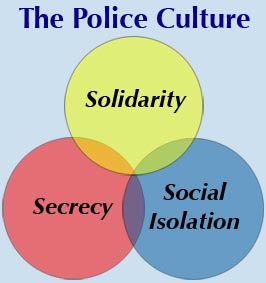The Police Culture
Culture, existing in most levels of society, may be defined as "the set of shared attitudes, values, goals, and practices that characterizes an institution or organization." This would seem to speak to the characteristics of a society in general. However, police have often been said to be a subculture—a part of but separate from the whole. Subculture has been defined as "an ethnic, regional, economic, or social group exhibiting characteristic patterns of behavior sufficient to distinguish it from others within an embracing culture or society." This definition seems appropriate when attempting to characterize a police organization. The police subculture has been characterized by three major norms: secrecy, solidarity, and social isolation.
Secrecy – Police officers involved in many sensitive operations and investigations often require secrecy. However, the issue of secrecy in policing far exceeds that which is necessary for normal operations. Secrecy in policing often extends to keeping silent about police deviant and even criminal behavior. Clearly, in society an informer or a rat is looked down upon. In policing, it is taken much more seriously. For example, if a police officer were to inform on another officer involved in criminal behavior, the informing officer would be viewed as a stool pigeon even though she or he did what his or her oath of office required.
Solidarity – Most police officers believe that the only person to come to his or her aid will be another police officer. Each officer is acutely aware of his or her human side and the potential for complaints from the public or some violation of departmental rules and regulations. Under such circumstances, fellow officers are expected to come to the aid of the officer(s) in trouble. The "us v. them" mentality not only refers to the adversarial perception of police v. public, in which most police sincerely believe, but also extends to within the police organization itself—in that line officers do not trust police administrators. This distrust was the driving force for the modern era of police unionization, which began in 1969 with the Patrolman’s Association of New Orleans (PANO).
Social Isolation – Because of the nature of their work, police officers feel isolated from the public, an isolation partly self-imposed. Many police officers see what they do as "asshole control," with a perception that they are pitted against the public in a "them vs. us" contest. They also believe that the general public dislikes them, though research indicates that the public overwhelmingly feels positively toward the police.

Reference
- http://www.m-w.com/dictionary/culture
- http://www.m-w.com/dictionary/subculture
- http://www.pano1544.com/history.html
- Van Mannen, J. (1978). The asshole. Policing: A view from the street. Peter Manning and John Van Mannen (Eds). Santa Monica, CA: Goodyear 221-238
